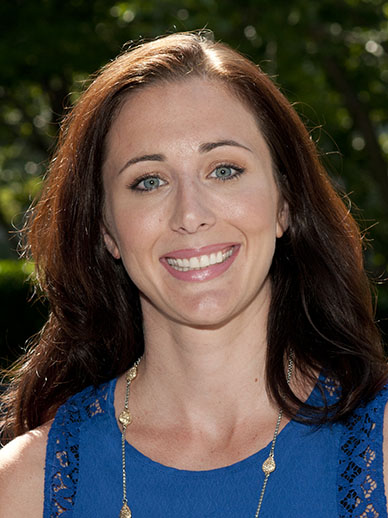PCOM Psychology Professor Publishes Book on Autism
April 2, 2018 One theme of this year’s National Autism Awareness Month is “a new perspective”—one
that encourages friends and collaborators to actively engage, and foster acceptance
and improvement.
One theme of this year’s National Autism Awareness Month is “a new perspective”—one
that encourages friends and collaborators to actively engage, and foster acceptance
and improvement.
In her recently published first book, Childhood Autism Spectrum Disorder: Evidence-Based Assessment and Intervention, Jessica Kendorski, PhD, associate professor of psychology and director of the MS Program in School Psychology at Philadelphia College of Osteopathic Medicine (PCOM), offers a practical perspective designed to promote parental engagement, and improvement
of skills in practitioners.
“There was a need for a practitioner-based book that could serve as one-stop-shop for
finding current, evidence-based approaches for intervention planning for children
with autism,” said Dr. Kendorski. “This is a practical tool, something that I would
give my students—those who are school social workers, school psychologists or clinical
psychologists.
Dr. Kendorski says that behavior analysis is the gold standard when it comes to planning
interventions for children with autism. “The research has found that early, intensive
behavior analysis is key for intervention planning,” she said. Behavior analysis seeks
to understand the environmental influences on a child’s behavior and alter them in
a way that promotes success and wellbeing. The focus, says Dr. Kendorski, “is to empower
children with autism to reach their full potential.
In addition to focusing on practitioners, this book also gives resources for parents,
too: checklists that they can review so they know exactly what should be included
in their child’s intervention plan.
“As a parent, you can look at those checklists, arm yourself with some knowledge of
best practices, and then meet with the school with some idea of what could or should
be included in a comprehensive plan for your child,” she said.
Finally, because there are a myriad of systems that are affected by autism—the gastroenterological
system, the neurobehavioral system, the sensory system—Dr. Kendorski said she wanted
her book to offer an interdisciplinary approach for practitioners to create an effective
intervention plan.
“The needs of children with autism span across so many aspects of the mind and body,
but individuals who treat those needs rarely communicate with each other,” she says.
“In the book, we talk about the best ways to encourage interdisciplinary collaboration,
and best practices for how to implement it.
Dr. Kendorski’s coauthor on this book was Amanda Guld Fisher, PhD, of Temple University.
You May Also Like:
About Philadelphia College of Osteopathic Medicine
Established in 1899, Philadelphia College of Osteopathic Medicine (PCOM) has trained
thousands of highly competent, caring physicians, health practitioners and behavioral
scientists who practice a “whole person” approach to care—treating people, not just
symptoms. PCOM, a private, not-for-profit accredited institution of higher education,
operates three campuses (PCOM, PCOM Georgia and PCOM South Georgia) and offers doctoral degrees in clinical psychology, educational psychology, osteopathic
medicine, pharmacy, physical therapy, and school psychology. The college also offers
graduate degrees in applied behavior analysis, applied positive psychology, biomedical
sciences, forensic medicine, medical laboratory science, mental health counseling,
physician assistant studies, and school psychology. PCOM students learn the importance
of health promotion, research, education and service to the community. Through its
community-based Healthcare Centers, PCOM provides care to medically underserved populations.
For more information, visit pcom.edu or call 215-871-6100.
Contact Us
For general media inquiries, please contact the Office of Marketing and Communications
at 215-871-6300 or communications@pcom.edu. Visit our media relations page to view contact information for public relations personnel.
Connect with PCOM

 One theme of this year’s National Autism Awareness Month is “a new perspective”—one
that encourages friends and collaborators to actively engage, and foster acceptance
and improvement.
One theme of this year’s National Autism Awareness Month is “a new perspective”—one
that encourages friends and collaborators to actively engage, and foster acceptance
and improvement.